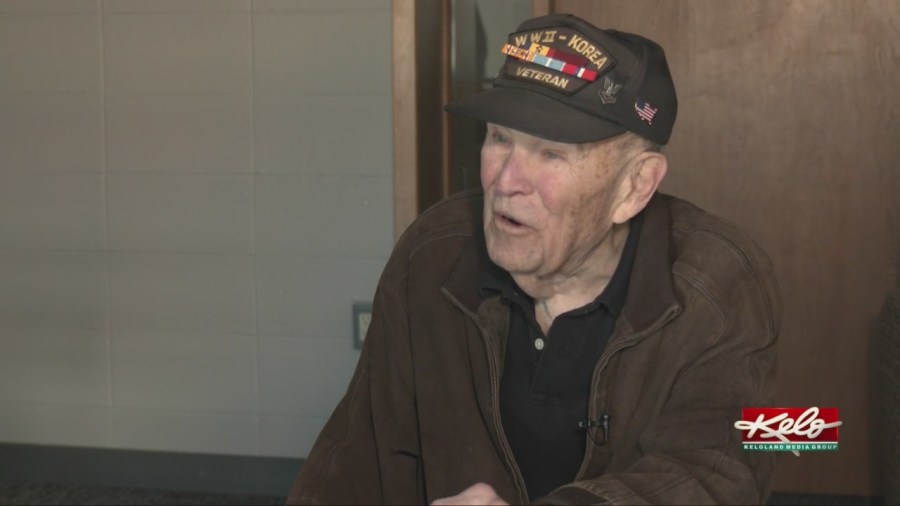SIOUX FALLS, S.D. (KELO) — They’re often called the greatest generation. We’re talking about World War II veterans.
Memories of World War II are disappearing each and every day because the men and women who fought in that war are now in their 90s or older. Preserving the stories of the men and women who served in World War II is more important now than ever before.
“We were fighting two wars, one in Europe the other in the South Pacific,” World War II veteran Doug Starr said.
Starr is now 99 years old and served two years in the South Pacific on a destroyer, called the Nicholas.
Starr says everything from the kitchen to the bathrooms to the bunk beds, the living quarters were tight.
Starr has written down his memoirs in this book titled ‘Sea Stories Worth Reading.’ That’s him on the cover when he first joined the Navy at age 17.
Starr was involved in numerous battles in his 21 months aboard the Nicholas taking over islands in the South Pacific that were controlled by the Japanese.
During the war, they all fought a different kind of battle at times too; a mind battle.
They all knew about Tokyo Rose.
It was a nickname given to a group of English-speaking female broadcasters who worked for the Japanese military during World War II.
The broadcasts were part of a psychological warfare campaign to demoralize American soldiers and their families.
“At the end of August, Tokyo Rose was on the radio and told everybody on the radio, whoever could hear her, that Japan had sunk the lead destroyer in the fleet, which was us, and she named it and said no survivors, well we didn’t know that because there was no way we could have heard that,” Starr said.
But his family back home did and they were devastated by the news, because at that time, they knew their son wouldn’t be coming home. It was something his mom was anticipating.
“And from September to October she was waiting for two Navy officers to show up and tell her, but they never did show up because it wasn’t so,” Starr said.
Starr’s destroyer had not been hit as proclaimed by Tokyo Rose.
So the war waged on, but it was about to come to an end after the atomic bombs dropped in Hiroshima and Nagasaki.
The Japanese had had enough.
Thinking back, Starr says Japan made a big mistake getting the U.S. involved when they attacked Pearl Harbor.
“Japan is kind of like Rhode Island attacking the state of Texas, because they attacked the United States, good Lord that was the stupidest thing they ever did,” Starr said.
Then at 9:04 in the morning on September 2nd, 1945, aboard the Missouri before representatives of nine Allied nations and sailors looking on, the Japanese signed the official Instrument of Surrender, prepared by the War Department and approved by President Truman.
It formally brought an end to the bloodiest conflict in human history and Starr witnessed it all.
It was a moment in history he’ll never forget.
He remembers his fellow Navy sailors talking about the table they brought up from the mess hall to do the official signing that brought the war to an end.
“It was over, they signed it so they took the table back down to the mess hall and they were like where’s the table that’s a piece of history, we got to keep it, where did you put it, I don’t know back down in the mess hall, they never did find the one they used,” Starr said.
In October when he finally got back to the states after experiencing so much, including help rescue POW’s after the war, Starr knew he still had one thing left to do.
“And the first thing I did was go grab a telephone and called home and my mother almost had a fit because she thought I was dead,” Starr said.
Far from it, now he’s part of living history.
Starr went on to join the Naval Reserve and got activated during the Korean War. He later went on to serve in the Coast Guard Reserve. In all, he served 33 years in the United States Military.


